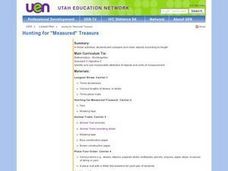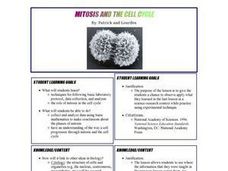Curated OER
Worms And More
Students complete five center activities that in order to determine the attributes of length and area. They study the vocabulary associated with measurement of length and area. They use blocks, play dough, wrapping paper, and footprints...
Curated OER
Recognizing Numerals and Numbers
Students develop number sense as well as number and number symbol awareness. Through various center activities, they practice recognizing the number symbol that is associated in a particular quantity. Instructions for four center...
Curated OER
Pancake Pictures
Students explore kitchen math and following multi-step directions by making pancakes. They assemble the ingredients and make the batter. Students create faces, geometric figures, shapes or lines using pancake batter.
Curated OER
Whole Number Game Time
First graders play math games to develop a better understanding of whole numbers. They represent and use whole numbers up to 100. They estimate how many times they would have to roll two dice before they would get to 100 and record...
Curated OER
Fraction Comparison Study
Pupils use the computer to complete comparison of fraction problems. In this comparing fractions worksheet, students learn to use the terms greater than, less than, and equal to.
Curated OER
GPS Scavenger Hunt
Middle schoolers go on a GPS scavenger hunt. They use GPS receivers to find designated waypoints and report back on what they found. They compute distances between waypoints based on the latitude and longitude, and compare with the...
Curated OER
Hang Time
Students simulate the motion of a fly ball with different winds. They use a partner to provide the simulated wind. Students draw a baseball diamond and the field on a piece of paper. They drag the pen across the paper to show the path of...
Curated OER
Space Science:Wherever You Go, There You Are
Students explore navigation principles by observing, measuring, and interpreting data to determine locations. Using a compass, compass rose, and a transit, they plot courses and discover the workings of the Global Positioning System...
Curated OER
Economics and emissions
Eighth graders produce a manufactured good and monitor energy consumption. In this Math lesson plan, 8th graders practice their basic math and accounting skills. Students participate in a business simulation.
Curated OER
Stem-and- Leaf Plots
Students are introduce to the notion of stem-and-leaf plots. They use stem-and-leaf plots to calculate the mean, median, and mode of a set of data. Students use computers to learn about stem-and-leaf plots.
Curated OER
Hunting for Measured Treasure
Students compare and contrast objects according to their length. In groups, they travel to different centers in their classroom to participate in different sorting activities. They are introduced to how to use a ruler and reading the...
Curated OER
Boxing On
Students participate in five center activities in which they construct three dimensional objects using cubic centimeter manipulatives such as sugar cubes and toothpaste boxes. They determine the volume of the objects. They build a model...
Curated OER
Triangles and Quadrilaterals
Second graders explore triangles and quadrilaterals. They rotate to various centers in the room to identify and examine triangles and quadrilaterals. After presenting a picture to the class, 2nd graders locate right angles, triangles...
Curated OER
Safety at Home
First graders identify safety hazards in the home and learn ways to prevent home accidents. In this home safety lesson plan, 1st graders discuss ways to keep a home safe by brainstorming and then reading a story about home safety. They...
Curated OER
Point Graphs
Students experiment with point graphs. In this math lesson, students are divided into groups and perform an experiment to see how high a ball bounces, recording their results on a point graph. Students then answer provided questions.
Helping with Math
Solving Equations with Two-Stepping! (2 of 4)
Multi-step problems are part of the progression when learning to solve equations. These 12 problems require only two steps to arrive at an answer. Either print the page out to assign as homework, or have learners write down the problems...
Curated OER
The Circle's Measure
Students explore circumference and diameter. For this math lesson, students apply their knowledge of circumference and diameter to solve mathematical riddles. Students apply this knowledge to find circumference and diameter of various...
Curated OER
Shapes
Students review basic shapes, such as circles, squares, triangles, and rectangles, find objects in those shapes in classroom, watch Clifford's Fun with Shapes video, practice reproducing four shapes, and rotate through four classroom...
Curated OER
Circles Minilab
Young scholars learn how to measure the diameter and circumference of a circle. For this circle lesson, students organize their data to create a graph. Young scholars utilize their graph to make an inference about the slope of pi.
Curated OER
X Marks the Spot
Fourth graders use games and puzzles to explore co-ordinate systems and their uses. Students are given the opportunity to invent their own systems by locating counters on a sheet of paper and by finding the dead center of a set of objects.
Curated OER
Mitosis And the Cell Cycle
Students determine the approximate time a cell spends in each phase of mitosis by counting cells in each phase from a prepared slide. They use a few simple calculations to estimate how long cells spend in each cycle in the body.
Curated OER
Related Angles
In this angle worksheet, students identify angles and then determine the related angle. Examples are provided. This one-page worksheet contains 36 problems, with answers at the bottom of the page.
Curated OER
My Reading Words in My Social Studies Book?
Connect social studies and language arts using this resource. After studying root words, have learners locate five words from their social studies book that have a prefix, suffix, or root word. This puts a new twist on practicing basic...
Curated OER
Dragon Math
Third graders, in groups, practice multiplication by putting five multiplication problems on white scales, then the answers on florescent colored scales.

























